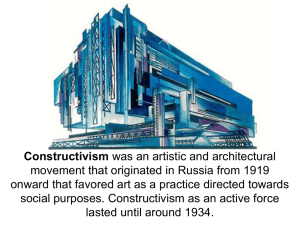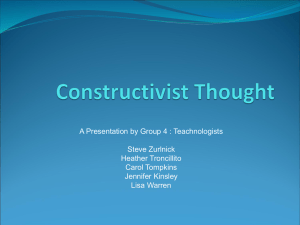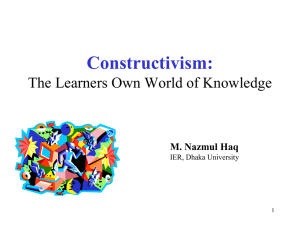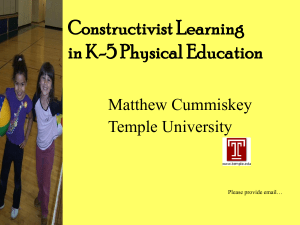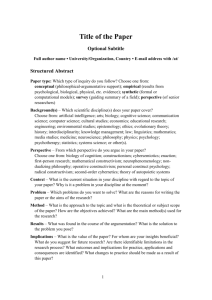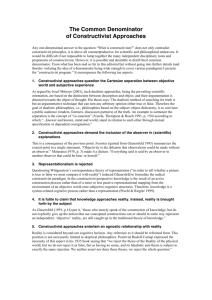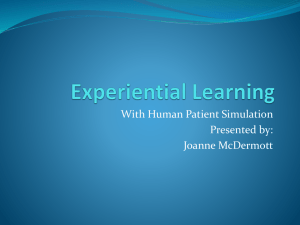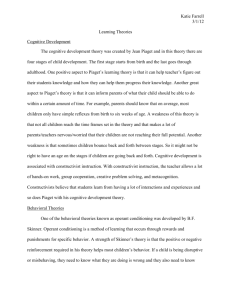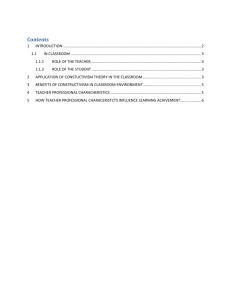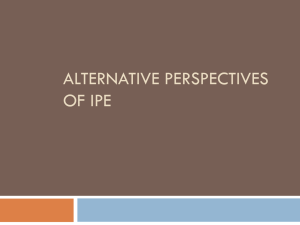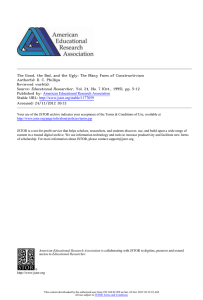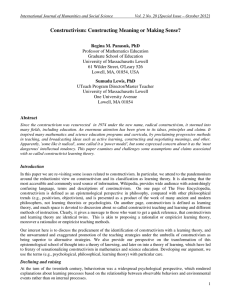Constructivism, Truth and Reality Hugh Gash St Patrick`s College A
advertisement
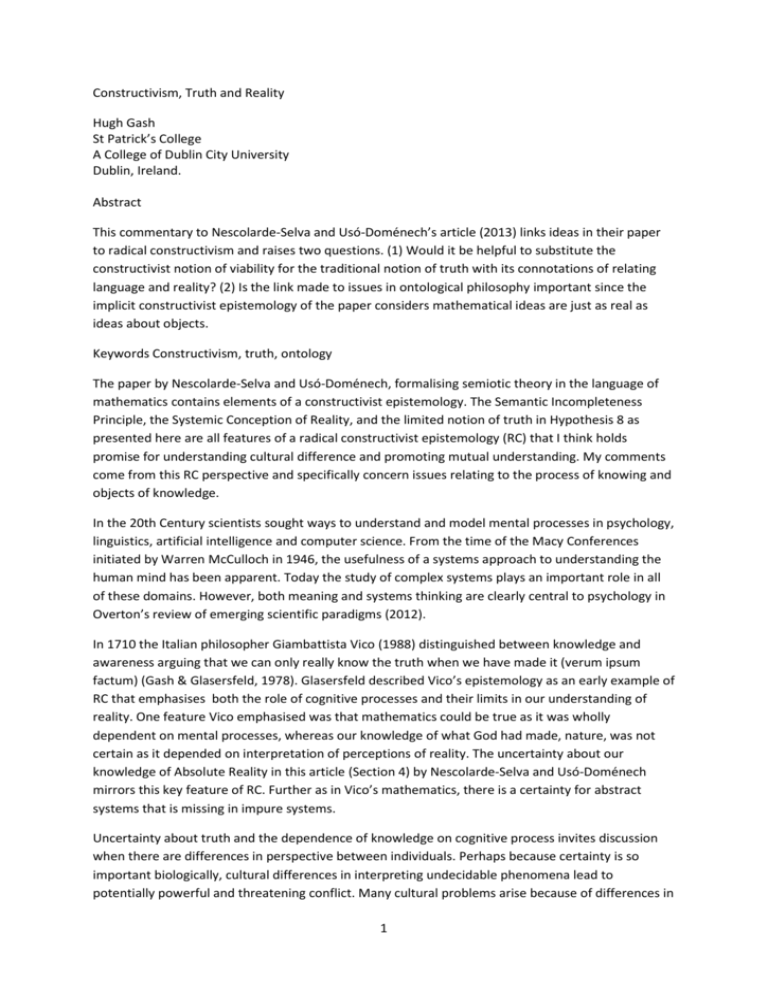
Constructivism, Truth and Reality Hugh Gash St Patrick’s College A College of Dublin City University Dublin, Ireland. Abstract This commentary to Nescolarde-Selva and Usó-Doménech’s article (2013) links ideas in their paper to radical constructivism and raises two questions. (1) Would it be helpful to substitute the constructivist notion of viability for the traditional notion of truth with its connotations of relating language and reality? (2) Is the link made to issues in ontological philosophy important since the implicit constructivist epistemology of the paper considers mathematical ideas are just as real as ideas about objects. Keywords Constructivism, truth, ontology The paper by Nescolarde-Selva and Usó-Doménech, formalising semiotic theory in the language of mathematics contains elements of a constructivist epistemology. The Semantic Incompleteness Principle, the Systemic Conception of Reality, and the limited notion of truth in Hypothesis 8 as presented here are all features of a radical constructivist epistemology (RC) that I think holds promise for understanding cultural difference and promoting mutual understanding. My comments come from this RC perspective and specifically concern issues relating to the process of knowing and objects of knowledge. In the 20th Century scientists sought ways to understand and model mental processes in psychology, linguistics, artificial intelligence and computer science. From the time of the Macy Conferences initiated by Warren McCulloch in 1946, the usefulness of a systems approach to understanding the human mind has been apparent. Today the study of complex systems plays an important role in all of these domains. However, both meaning and systems thinking are clearly central to psychology in Overton’s review of emerging scientific paradigms (2012). In 1710 the Italian philosopher Giambattista Vico (1988) distinguished between knowledge and awareness arguing that we can only really know the truth when we have made it (verum ipsum factum) (Gash & Glasersfeld, 1978). Glasersfeld described Vico’s epistemology as an early example of RC that emphasises both the role of cognitive processes and their limits in our understanding of reality. One feature Vico emphasised was that mathematics could be true as it was wholly dependent on mental processes, whereas our knowledge of what God had made, nature, was not certain as it depended on interpretation of perceptions of reality. The uncertainty about our knowledge of Absolute Reality in this article (Section 4) by Nescolarde-Selva and Usó-Doménech mirrors this key feature of RC. Further as in Vico’s mathematics, there is a certainty for abstract systems that is missing in impure systems. Uncertainty about truth and the dependence of knowledge on cognitive process invites discussion when there are differences in perspective between individuals. Perhaps because certainty is so important biologically, cultural differences in interpreting undecidable phenomena lead to potentially powerful and threatening conflict. Many cultural problems arise because of differences in 1 what is accepted as true. Given this uncertainty about meaning and truth, I wonder if Glasersfeld’s suggestion that “viability” avoids the epistemological connotations suggested by the concept “truth” may be helpful? Reality and the ontological dimension are an important part of this paper. Also, the authors assume the existence of an unfragmented but unknowable Absolute Reality. RC has avoided ontology because what we know of reality we base on a comparison of the result of a prior cognitive process with the result of a present process (Glasersfeld, 1995). So, direct comparison between what we know and phenomena is impossible. Accepting this way of thinking involves accepting the Semantic Incompleteness Principle and recognising the importance of the role of culture in our interpretations of experience. It seems that RC and the authors agree about this aspect of epistemology. A substantial domain of scholarship exists, mentioned by the authors with reference to the work of Penelope Maddy, Willard Quine and Hartry Field, bearing on whether sets exist in reality and whether their existence is warranted because as mathematical entities they are indispensable to science. While these arguments are an essential part of the philosophical work concerning the relation between existence and thought, it seems to me that these considerations on Platonism and existence belong to a different domain and are not germane to the thrust of this paper. The authors’ position that knowledge is a semiotic construction means that both mathematical knowledge and our knowledge of reality are each on a similar footing. Both the existence of mathematical entities and other objects of knowledge depend on the processes used to specify them (Schmidt, 2011). References Gash, H., & Glasersfeld, E. von. (1978). Vico (1668-1744): An early anticipator of radical constructivism. Irish Journal of Psychology, 4, 22-32. Glasersfeld, E. von. (1995). Radical Constructivism: A Way of Knowing and Learning. New York: Routledge Falmer . Nescolarde-Selva, J. and Usó-Doménech, J.L. (2013). Reality, System and Impure Systems. Foundations of Science. DOI: 10.1007/s10699-013-9337-8. Overton, W. F. (2012). Evolving scientific paradigms: Retrospective and prospective. In L. L’Abate (Ed.), The role of paradigms in theory construction. (pp. 31-65). New York: Springer Schmidt, S. (2011). From Objects to Processes: A Proposal to Rewrite Radical Constructivism. Constructivist Foundations, 7, 1. 1-9 & 37-47. Vico, G. (1988) On the Most Ancient Wisdom of the Italians. (L. Palmer., Trans.) Cornell: Cornell University Press. (Original work published 1710). 2
